Jon Brodkin
Getty Illustrations or photos | Anadolu Agency
Netflix and YouTube are the two cutting down video-streaming high quality in Europe to decrease the worry on household broadband networks prompted by the coronavirus pandemic forcing people to remain property.
Netflix is cutting down the bit amount on online video streams, but not the resolution, for the next 30 days in the EU and United kingdom, the BBC documented. The BBC stated that “flicks will nevertheless be superior-definition or ultra-superior definition 4K” in spite of the little bit-price minimize, but other news resources propose that resolution could be reduce, as well. It is really not clear what the precise variations in bit premiums are—we asked Netflix to explain these points but have not gotten an respond to still.
Immediately after conversations with a European govt official who called for lowered video clip high quality, “Netflix has decided to start reducing little bit charges throughout all our streams in Europe for 30 days,” Netflix mentioned in a statement quoted by The Verge. “We estimate that this will cut down Netflix traffic on European networks by around 25 p.c when also making certain a good high quality provider for our associates.”
The Verge write-up also observed that “if bandwidth is minimal, videos will instantly stream at a lessen resolution.”
YouTube seems to be taking a somewhat distinctive solution. “We are making a dedication to quickly switch all site visitors in the EU to typical definition by default,” YouTube claimed in a assertion quoted by Reuters nowadays. YouTube owner Google informed Ars that the modify will be in put in the EU and British isles for 30 times.
Normal definition frequently signifies 480p, or DVD excellent. But YouTube’s assertion that movies will stream in “common definition by default” means that buyers can retain making use of the toggle on just about every online video to switch to a bigger resolution. Google confirmed to Ars that people can however manually change the top quality of any video clip they view on a laptop, Tv set, or cell system. Making 480p the default would even now lower total broadband-info use appreciably, even if many end users change to better resolutions.
Google informed Ars that YouTube has “noticed only a couple usage peaks,” and has “actions in position to routinely alter our system to use much less community capability.” We questioned Netflix if it has noticed any general performance difficulties. We also asked Netflix and YouTube no matter whether they plan to make equivalent changes in the US as the pandemic goes on. We’ll update this story if we get any much more specifics.
Use up, but networks have additional potential
Just how needed these methods are is just not obvious, but Netflix and Google were being below strain to make the transform. Thierry Breton, a French politician who is the European commissioner for Inner Sector and Products and services, tweeted that he spoke with Netflix CEO Reed Hastings to urge a swap to common definition. Breton also spoke with Google officers, Google instructed Ars.
“Teleworking and streaming enable a whole lot but infrastructures may be in pressure,” Breton wrote. “To secure World wide web access for all, let us #SwitchToStandard definition when Hd is not necessary.”
United kingdom-based World-wide-web service provider BT stated these days that irrespective of the latest raise in broadband utilization, “we have a lot of headroom for it to mature even now further more.” British isles-centered ISPs Vodafone and TalkTalk also explained they have plenty of potential.
In usual times, residential broadband networks have comparatively low use throughout the day and spikes at evening when persons are household and observing streaming movie. What issues most is the ability to deal with peak masses if a network has a lot more than sufficient potential to handle the usual nighttime peaks, they may possibly be able to handle pandemic concentrations of targeted traffic with out much of a dilemma. In the US, we might be expecting cable and fiber networks to deal with the surge really nicely, but outdated DSL networks and satellite services are a unique story because people networks have ability difficulties even in standard times.
Comcast and AT&T have briefly suspended details-cap enforcement simply because of the pandemic, which could boost bandwidth utilization. But information caps and overage charges are a profits-technology tool fairly than an efficient procedure for handling congestion. Some big ISPs these as Verizon and Constitution you should not even hassle with knowledge caps, so they failed to have to make any improvements on that front. (Charter is prohibited from offering options with data caps and overage many thanks to a merger condition imposed on its 2016 buy of Time Warner Cable, and that merger situation expires in 2023.)
According to a BroadbandNow evaluation released Tuesday, “household Net connections [are] holding continuous in most significant US cities amid [the] mass change to distant perform.”
Cloudflare examined Internet-usage designs in European countries and discovered increased usage both on final-mile networks and at the Web trade points at which ISPs trade website traffic with each other. But while Web usage is rising 10 to 40 percent relying on the place, “major variations in World-wide-web visitors aren’t abnormal,” often “take place[ring] all over significant sporting occasions like the Olympics or Earth Cup, cultural gatherings like the Eurovision Song Contest and even for the duration of Ramadan at the breaking of the rapid just about every working day,” Cloudflare wrote.
“Even even though from time to time unique services—such as a web site or an app—have outages, the main of the Online is strong,” Cloudflare wrote. “Site visitors is shifting from company and university networks to residential broadband, but the Net was made for improve.”
This post was updated with comments from Google.
Disclosure: The Advance/Newhouse Partnership, which owns 13 % of Charter, is section of Advance Publications. Progress Publications owns Condé Nast, which owns Ars Technica.




